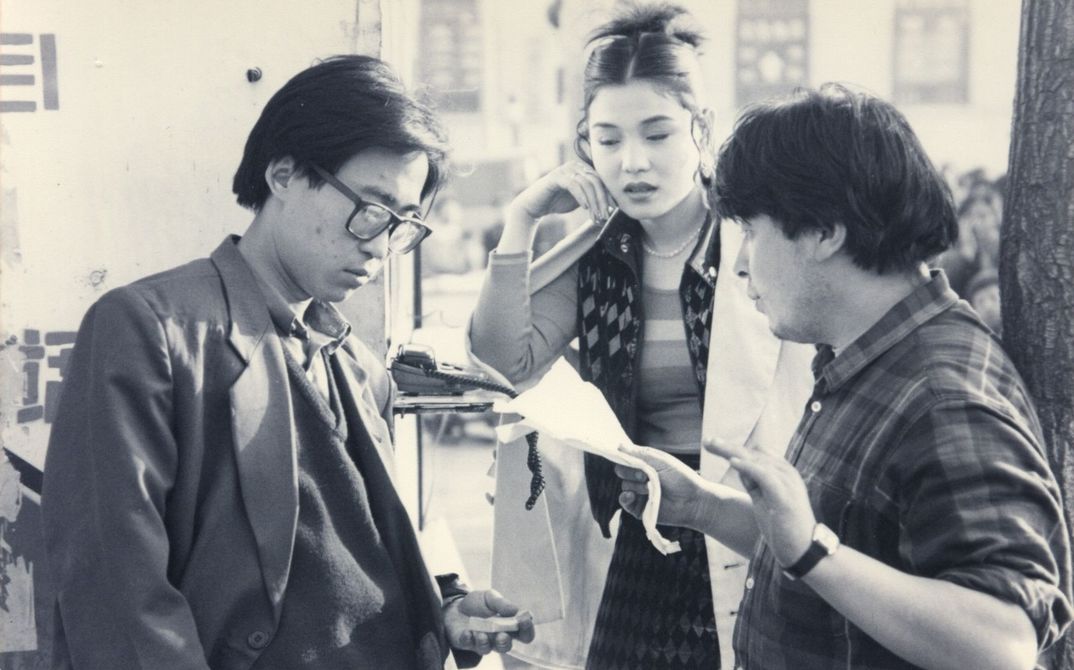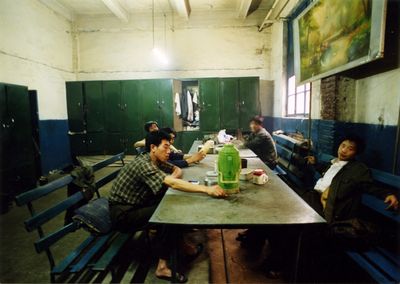Although K and LIFE AFTER LIFE didn't cost a fortune, the fact that they are still without domestic distribution nevertheless put certain strains on the company finances, no?
True. One difficulty is the overseas market, which is effectively closed to the works of young directors. It's nearly impossible for a first or second film to find foreign distribution. The best we can do is to play the international film festival circuit and bring those films to global festival audiences. These days, it’s such a challenge to sell overseas. The other difficulty is of course the domestic market. Since these films can't be released, there's zero box office income. Then there are other headaches like piracy. Right now, we have to rely on other projects to finance these productions. My company runs a side business, doing commercials and other corporate projects, and we use that income to help young directors. To put it plainly, I simply have to go out and make more commercials.
And how's business?
Not bad. We’re quite popular.
Do you think this generation of independent directors is any different from the previous ones? Ten or twenty years ago, a young person without any stories to tell or anything to say who was interested in becoming a director had no option but to make independent films. There wasn't a movie industry for him or her to break into. Today there's an industry, and young people interested in making movies without necessarily wanting to make personal films can now find happiness there. Is that really happening?
Yes. There are many people interested in making independent cinema, but even more interested in making commercial box office hits. Over the past couple of years, the majority of box office hits have been debut films. That's very unusual. It's especially true with the first or second films by actor-turned-directors. They were either comedies or action thrillers, and were all very successful. In some ways, these success stories do lure young people into the industry to turn out commercial product.
There’s something that’s always bugging me, and that’s that independent cinema has not built up its own industry infrastructure. I think that’s essential. We need a system to properly channel investments and returns, and to engage with and protect the people working in independent cinema. Things haven’t improved much over the past ten or fifteen years, independent filmmakers are still working in an unstructured environment. I so desperately want Chinese independent cinema to be like its French or Japanese counterparts, with crew members, cinemas and distribution companies dedicated to the business of independent cinema. Here we have no distribution companies and cinemas at all that are doing that. We have no means of getting our films to the public, there are no portals, no exits; all we have is making films. This is a major issue for Chinese independent cinema. If it doesn’t get resolved, it’s going to have a negative effect on creativity. We’re already seeing independent films that have a similar look. They look similar because their production conditions are similar. Similar production conditions make for similar thematic and generic explorations, as well as aesthetic experimentation. When everyone is making films with 50,000 or 100,000 RMB, they invariably look similar.
Grave as it is, it doesn’t seem like an issue that will be resolved in the near future. But audiences with a serious interest in cinema, be it domestic or foreign, have always understood that the best Chinese films were usually produced under less than ideal conditions. Do you see any changes in that?
I don’t see too many changes on the horizon. I said that the situation has got worse because I feel that the production conditions in the ‘90s were actually better. People like Lou Ye and Wang Xiaoshuai were making films under proper production conditions. Back then, there wasn’t a market, but there were quite a few new film companies with a cultural vision. Cinema is culture, and it deserves investment. People were willing to engage with cinema as a form of culture and take the financial risks accordingly. The Chinese film market has struck gold in the past few years, and most, if not all film companies see cinema as an instrument to make money fast. With fewer companies interested in film culture or prepared to take risks, young directors have just one task: to churn out money-spinners. The development of private enterprises is another issue that needs addressing.
Without a mature, structured industry, each independent filmmaker is pretty much on their own. Everyone has different financial backers, everyone has different creative teams, and everyone has their different problems. There is no cohesion and that why it’s fairly difficult to make generalisation about contemporary Chinese independent cinema. There are indie directors like Hao Jie who found financial support from the Wanda Group, and tried to strike a balance between the commercial and the personal with MY ORIGINAL DREAM. There are also directors like Pema Tsedan, who has continued to seek support from his friends in Tibet, with his team being largely made up of friends and students from film academies. There are also directors who take on different responsibilities, like Yang Jing, who became Hao’s cinematographer in MY ORIGINAL DREAM. If there is one common characteristic among all the independent films today, it’s their very, very low budget.
So there haven’t been any real changes for independent directors making personal films?
I think things have changed for the worse. In the early days, the films of Zhang Yuan like MAMA and BEIJING BASTARD, or the first three films of Wang Xiaoshuai and Lou Ye actually painted a rosier picture as far as production conditions are concerned. You could see that the production qualities were improving with each new film. Today it’s very hard for an independent director to reach that standard.
Everything has become so expensive, is that right? An independent director may never have the budget to make a film at a standard industry level.
Very, very expensive, especially the wages of the crew. They are way out of an indie filmmaker’s league. Another thing that’s changed for the worse is the media. Before it became totally commercialised in recent years, the media used to be enthusiastic about independent cinema. But as the market continues to expand, the media is now just one link in the film industry’s marketing strategy chain. When that happens, the media has little space left for independent cinema. I won’t say coverage has totally disappeared, but it’s really dwindling.
And reviews?
There are very few of them. There are some voices on social media, but hardly any in the mass media. When it comes to social impact, the mass media is of course so much more powerful and overwhelming that it drowns out other voices.
So apart from various outstanding and resilient individual efforts, the independent scene in China today continues to be subject to large outside forces, with little prospect of a cohesive structure developing. That doesn’t seem too promising, does it?
The continuous growth in the Chinese film market has created a situation where “box office” has become the only measure of success, which has degraded the value of independent cinema. Today, there is scant support for independent films that address pressing contemporary social issues. Instead, they are neglected or even treated with suspicion. Rising nationalist sentiments have already caused remarks on independent film to surface along the lines of “currying favour with the West by exposing society’s dark sides.” Whenever and wherever standards and values are in tatters, independent filmmakers cast a lonely shadow.

